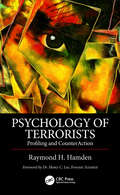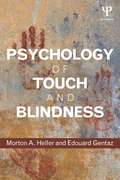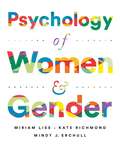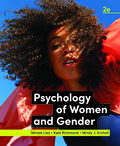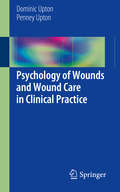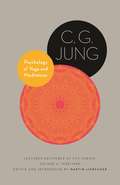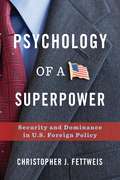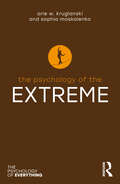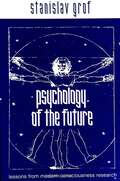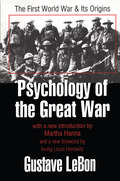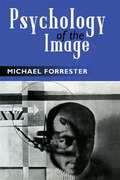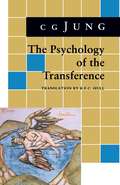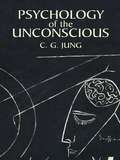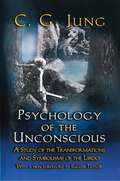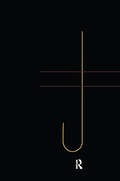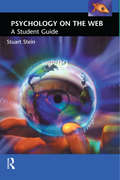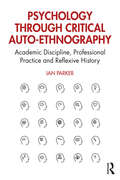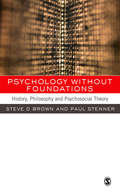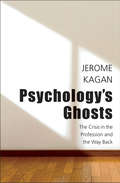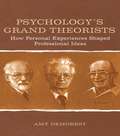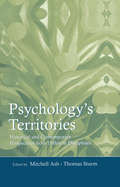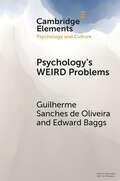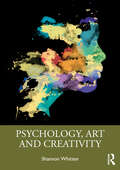- Table View
- List View
Psychology of Sustainability: From Sustainability Marketing to Social-Ecological Transformation
by Marcel HuneckeThis book analyzes key findings and developments of psychology for sustainable development. The starting point is a discussion of the established literature of environmental psychology in regards to which factors influence environment-related behavior. Afterwards, the author discusses strategies and interventions that can promote sustainable behavior. It is very important that in order to increase the effectiveness of environmental psychological interventions, these must be first contextualized socially. Furthermore, interventions that aim to bring about a socio-ecological transformation should also focus on the goal of subjective well-being. Overall, the findings of environmental psychology are brought together with theories from positive psychology and the approach of psychological resources from positive psychology and the approach of psychological resources from health psychology to answer the question: How can the socio-ecological transformation of a consumer society be supported by an inner transformation of human beings. An answer to this question is provided by the promotion of six psychological resources for sustainable lifestyles: mindfulness, capacity for pleasure, self-acceptance, self-efficacy, construction of meaning and solidarity can both promote individual well-being and increase motivation for sustainable behavior.
Psychology of Terrorists: Profiling and CounterAction
by Raymond H. HamdenThe Psychology of Terrorists examines the personality profile of the individual and categorizes the psychology of terrorists into four distinct profiles which are outlined and analyzed in detail. There are many books that cover social psychology and political violence and aggression, but few establish the mind-set of the terrorist as an individual. This includes taking into account personal experiences, and religious or political ideology for the purposes of understanding conceptual and tactical objectives and profiling terrorists to counter terrorist threats. <P><P>Dr. Raymond Hamden presents a unique look at terrorists as individuals with personal motives as well as those of principle. The book presents an analysis of terrorists without prejudice or bias for any political, religious, nationality, creed, or race. Too many times the world see experts focus on issues that are based on their own predispositions or partialities. Although there is criticism on the reliability of profiling, this research demonstrates validity and reliability. It is vital to understand terrorist motivations and this can only be achieved by "knowing" the terrorists' psychological character, looking at the individual terrorist, taking into account particular experiences, psychological makeup, background, and fundamentalist ideology. <P><P>The Psychology of Terrorists: Profiling and CounterAction will be a welcomed addition to psychologists, terrorism researchers, criminal profilers, investigators and intelligence professionals, counter- and anti-terrorism experts, as well as military, security, and law enforcement professionals tasked with protecting individuals from the various acts of terrorism, domestically and globally.
Psychology of Touch and Blindness
by Edouard Gentaz Morton A. HellerThis book reviews the considerable body of research that has been done to evaluate the touch skills of blind people. With an emphasis on cognitive and neuroscientific approaches, it encompasses a wide-ranging discussion of the theoretical issues in the field of touch perception and blindness. The volume includes chapters on sensory aspects of touch, perception in blind individuals, multimodal relations and their implications for instruction and development, and new technology, including sensory aids and virtual touch. A distinctive feature of the book is the inclusion of the practical applications of research in this area. A significant characteristic of research on touch and imagery in congenitally blind individuals is that it speaks to the basic nature of spatial imagery and the importance and necessity -- or lack thereof -- of specific visual sensory experience for the acquisition of knowledge about space, spatial layout, and picture perception. As such, the book will not only appeal to researchers and professionals with an interest in touch and blindness, but also to a wider audience of cognitive psychologists and cognitive neuroscientists working in the field of perception.
Psychology of Women and Gender
by Miriam Liss Kate Richmond Mindy ErchullPlacing a central focus on the concerns of students today, this text deals with important, timely topics such as intersectionality, transgender issues, sexualization, and objectification. It combines up-to-date research with an approachable and engaging writing style, while also providing students with hands-on exercises and thought-provoking debate topics. Flexible teaching resources support every kind of instructor’s course.
Psychology of Women and Gender (Second Edition)
by Miriam Liss Kate Richmond Mindy J. ErchullGround-breaking, inclusive, and modern for a new generation of students Providing a lens for interpreting the ever-changing issues that influence girls, women, and trans and/or gender nonbinary individuals today, Psychology of Women and Gender 2e incorporates an intersectional lens throughout the text. It expands the idea of gender by challenging assumptions of a gender binary and includes additional focus on the experiences of men. The new edition is grounded in both feminist theory and psychological research. A new research methods chapter teaches students to use research and critical thinking to strengthen their own voices. Student learning becomes active with a new and engaging Norton Illumine Ebook that engages students with active learning opportunities, including embedded videos that make the content come alive through the voices of diverse individuals, and Check Your Understanding questions that provide retrieval practice so students “lock in” what they learn in every section.
Psychology of Wounds and Wound Care in Clinical Practice
by Penney Upton Dominic UptonThis book addresses the psychological consequences of wounds and the psychological components of wound care, building on contemporary research evidence and presenting practical clinical guidelines. Particular emphasis is given to the psychological impact of both wounds and wound treatment. Implications for practice are discussed, making this book both educational and practical. Psychology of Wounds and Wound Care in Clinical Practice is aimed at clinicians, including GPs, vascular surgeons and physicians, nurses, especially tissue viability nurses, and podiatrists, and is also of interest to academic teachers and researchers.
Psychology of Yoga and Meditation: Lectures Delivered at ETH Zurich, Volume 6: 1938–1940 (Philemon Foundation Series #22)
by C. G. JungJung's lectures on the psychology of Eastern spirituality—now available for the first timeBetween 1933 and 1941, C. G. Jung delivered a series of public lectures at the Swiss Federal Institute of Technology (ETH) in Zurich. Intended for a general audience, these lectures addressed a broad range of topics, from dream analysis to the psychology of alchemy. Here for the first time are Jung's illuminating lectures on the psychology of yoga and meditation, delivered between 1938 and 1940.In these lectures, Jung discusses the psychological technique of active imagination, seeking to find parallels with the meditative practices of different yogic and Buddhist traditions. He draws on three texts to introduce his audience to Eastern meditation: Patañjali's Yoga Sûtra, the Amitâyur-dhyâna-sûtra from Chinese Pure Land Buddhism, and the Shrî-chakra-sambhâra Tantra, a scripture related to tantric yoga. The lectures offer a unique opportunity to encounter Jung as he shares his ideas with the general public, providing a rare window on the application of his comparative method while also shedding light on his personal history and psychological development.Featuring an incisive introduction by Martin Liebscher as well as explanations of Jungian concepts and psychological terminology, Psychology of Yoga and Meditation provides invaluable insights into the evolution of Jung's thought and a vital key to understanding his later work.
Psychology of a Superpower: Security and Dominance in U.S. Foreign Policy
by Christopher FettweisWith the collapse of the Soviet Union, the United States was left as the world’s sole superpower, which was the dawn of an international order known as unipolarity. The ramifications of imbalanced power extend around the globe—including the country at the center. What has the sudden realization that it stands alone atop the international hierarchy done to the United States? In Psychology of a Superpower, Christopher J. Fettweis examines how unipolarity affects the way U.S. leaders conceive of their role, make strategy, and perceive America’s place in the world.Combining security, strategy, and psychology, Fettweis investigates how the idea of being number one affects the decision making of America’s foreign-policy elite. He examines the role the United States plays in providing global common goods, such as peace and security; the effect of the Cold War’s end on nuclear-weapon strategy and policy; the psychological consequences of unbalanced power; and the grand strategies that have emerged in unipolarity. Drawing on psychology’s insights into the psychological and behavioral consequences of unchecked power, Fettweis brings new insight to political science’s policy-analysis toolkit. He also considers the prospect of the end of unipolarity, offering a challenge to widely held perceptions of American indispensability and asking whether the unipolar moment is worth trying to save. Psychology of a Superpower is a provocative rethinking of the risks and opportunities of the global position of the United States, with significant consequences for U.S. strategy, character, and identity.
Psychology of the Extreme (The Psychology of Everything)
by Arie W. Kruglanski Sophia MoskalenkoWhat does extremism mean? How does it show up in our daily lives? What drives people to extreme behaviors, and how can we learn to live and thrive in the age of overdrive?The Psychology of the Extreme provides an accessible introduction to extremism as a force that can affect all aspects of culture and people’s choices in everyday settings. It explores the underlying psychology behind what makes people act in extreme ways, whether this is in destructive ways (such as gambling, terrorism and political violence) or in constructive ways (such as successful creators and scientists). The book features an array of case studies that show how extremism can be both pro-social and anti-social and includes interventions to reduce extremism or redirect them toward more positive and constructive tendencies. Offering a new understanding of the individual psychology of extremism, the book will appeal to all those interested in how extremism plays out in people’s and cultures' day-to-day lives.
Psychology of the Future: Lessons from Modern Consciousness Research (SUNY series in Transpersonal and Humanistic Psychology)
by Stanislav GrofSummarizes Grof's experiences and observations from more than forty years of research into non-ordinary states of consciousness.This accessible and comprehensive overview of the work of Stanislav Grof, one of the founders of transpersonal psychology, was specifically written to acquaint newcomers with his work. Serving as a summation of his career and previous works, this entirely new book is the source to introduce Grof's enormous contributions to the fields of psychiatry and psychology, especially his central concept of holotropic experience, where holotropic signifies "moving toward wholeness." Grof maintains that the current basic assumptions and concepts of psychology and psychiatry require a radical revision based on the intensive and systematic research of holotropic experience. He suggests that a radical inner transformation of humanity and a rise to a higher level of consciousness might be humankind's only real hope for the future."It's rare to find a textbook that is both extremely informative and enjoyable to read. Psychology of the Future has to be one of the first ones I've ever come across … Each chapter brought an entirely new concept, theory, or method that was just as engaging as the previous one." — Dr. Tami Brady, TCM Reviews"This book is by a pioneering genius in consciousness research. It presents the full spectrum of Grof's ideas, from his earliest mappings of using LSD psychotherapy, to his clinical work with people facing death, to his more recent work with holotropic breathing, to his latest thoughts about the cosmological implications of consciousness research and the prospects for dealing with an emerging planetary crisis. Grof has always been one of the most original thinkers in the transpersonal field, and his creativity has kept pace with the maturity of his overall vision." -- Michael Washburn, author of Transpersonal Psychology in Psychoanalytic Perspective"Grof offers an outstanding contribution to the ever-growing debate about the nature of human consciousness and about the place of humankind in the cosmos. If more psychiatrists could be persuaded that human consciousness transcends the limitations of the physical brain, and instead is but an aspect of what may best be described as 'cosmic consciousness,' we could not only expect treatment modalities to change, but we could also anticipate the possibility of culture-wide rethinking of the basic presuppositions of modern cosmology, the cosmology that grounds Western institutions, ideologies, and beliefs about the nature of personhood." -- Michael E. Zimmerman, author of Contesting Earth's Future: Radical Ecology and PostmodernityStanislav Grof, MD, is a psychiatrist with more than fifty years of experience in research of non-ordinary states of consciousness. He has been Principal Investigator in a psychedelic research program at the Psychiatric Research Institute in Prague, Czechoslovakia; Chief of Psychiatric Research at the Maryland Psychiatric Research Center; Assistant Professor of Psychiatry at the Johns Hopkins University; and Scholar-in-Residence at the Esalen Institute. He is currently Professor of Psychology at the California Institute of Integral Studies, conducts professional training programs in holotropic breathwork, and gives lectures and seminars worldwide. He is one of the founders and chief theoreticians of transpersonal psychology and the founding president of the International Transpersonal Association (ITA). In 2007, he was granted the prestigious Vision 97 award from the Vaclav and Dagmar Havel Foundation in Prague. He is the author and editor of many books, including The Adventure of Self-Discovery: Dimensions of Consciousness and New Perspectives in Psychotherapy and Inner Exploration; Ancient Wisdom and Modern Science; Beyond the Brain: Birth, Death, and Transcendence in Psychotherapy; The Cosmic Game: Explorations of the Frontiers of Human Consciousness; and Human Survival and Consciousness Evolution; all published by SUNY Press.
Psychology of the Great War: The First World War and Its Origins
by Shayne C. Gad Carrol S. WeilThe outbreak of World War I saw the collapse of socialist notions of class solidarity and reaffirmed the enduring strength of nationalism. The workers of the world did not unite, but turned on one another and slaughtered their fellows in what was then the bloodiest war in history. There have been many efforts to explain the outbreak of war in 1914, but few from so intimate a perspective as LeBon's. He examines such questions as why German scholars tried to deny Germany's obvious guilt in the war, and what explained the remarkable resolve of the French army to persevere in the face of unprecedented adversity.To such questions, LeBon proposes answers built upon principles well articulated in the larger body of his work. He transforms the character of the debate by demonstrating how psychological principles explain more persuasively both the causes of German academic ignominy and the origins of French valor. Convinced as he was that only psychology could illuminate collective behavior, LeBon dismisses purely economic or political interpretations as ill-conceived and inadequate precisely because they fail to appreciate the role of psychology in the collective behavior of national statesmen, prominent scholars, and ordinary soldiers.The Psychology of the Great War provides a bridge to study both crowd behavior and battlefield behavior by illustrating how ordinary people are transformed into savages by great events. This element in LeBon's thinking influenced Georges Sorel's thinking, as he had seen the same phenomenon in those who participated in general strikes and revolutions. And in a later period and different context, Hannah Arendt gave this strange capacity of the ordinary to be transformed into the extraordinary the name "banality of evil." The book will be of interest to social theorists, psychologists concerned with group behavior, and historians of the period.
Psychology of the Image (Psychology Press And Routledge Classic Editions Ser.)
by Michael ForresterPsychology of the Image outlines a theoretical framework bringing together the semiotic concepts developed by Charles Peirce, the sociological insights of Ervin Goffman and the psychoanalytic ideas of Jacques Lacan. Image studies in fashion, advertising, photography, film studies and psychology have been influenced by these theorists in significant ways. The framework presented helps the reader understand how these ideas relate to the study of different domains of the image: the internal imagery of dreams, external images such as the photograph and image processes which span both contexts, e.g., images we have about ourselves. The topics discussed are organised into three themes. The first considers mental imagery, including sound and dreams. The second addresses the interdependent nature of internal and external images, e.g., the gendered self and social identity. In the third theme, attention turns to external images including television, film, photography, the computer and the internet. Psychology of the Image will be of interest to undergraduates, postgraduates, lecturers and researchers in the fields of psychology, media studies and sociology.
Psychology of the Transference: (From Vol. 16 Collected Works) (Jung Extracts #8)
by C. G. JungExtracted from Volume 16. An authoritative account, based on a series of 16th century alchemical pictures, of Jung's handling of the transference between analyst and patient.
Psychology of the Unconscious
by C. G. JungIn this, his most famous and influential work, Carl Jung made a dramatic break from the psychoanalytic tradition established by his mentor, Sigmund Freud. Rather than focusing on psychopathology and its symptoms, the Swiss psychiatrist studied dreams, mythology, and literature to define the universal patterns of the psyche.In Psychology of the Unconscious, Jung seeks a symbolic meaning and purpose behind a given set of symptoms, placing them within the larger context of the psyche. The 1912 text examines the fantasies of a patient whose poetic and vivid mental images helped Jung redefine libido as psychic energy, arising from the unconscious and manifesting itself consciously in symbolic form. Jung's commentary on his patient's fantasies offers a complex study of symbolic psychiatry and foreshadows his development of the theory of collective unconscious and its constituents, the archetypes.The author's role in the development of analytical psychology, a therapeutic process that promotes creativity and psychological development, makes this landmark in psychoanalytic methodology required reading for students and others interested in the practice and process of psychology.
Psychology of the Unconscious: A Study of the Transformations and Symbolisms of the Libido (The Collected Works of C. G. Jung - Supplements #5)
by C. G. Jung"This book became a landmark, set up on the spot where two ways divided. Because of its imperfections and its incompleteness it laid down the program to be followed for the next few decades of my life." Thus wrote C. G. Jung about his most famous and influential work, the one that marked the beginning of his divergence from the psychoanalytic school of Freud. In this book Jung explores the fantasy system of Frank Miller, the young American woman whose account of her poetic and vivid mental images helped lead him to his redefinition of libido while encouraging his explorations in mythology. Published in 1912 as Wandlungen und Symbole der Libido, this is a key text for the study of the formation of Jung's ideas and for understanding his personal and psychological condition during this crucial time. Miller's fantasies, with their mythological implications, supported Jung's notion that libido is not primarily sexual energy, as Freud had described it, but rather psychic energy in general, which springs from the unconscious and appears in consciousness as symbols. Jung shows how libido organizes itself as a metaphorical "hero," who first battles for deliverance from the "mother," the symbol of the unconscious, in order to become conscious, then returns to the unconscious for renewal. Jung's analytical commentary on these fantasies is a complex study of symbolic parallels derived from mythology, religion, ethnology, art, literature, and psychiatry, and foreshadows his fundamental concept of the collective unconscious and its contents, the archetypes.
Psychology of the Unconscious: Supplementary Volume B (Collected Works of C. G. Jung)
by C. G. JungUnavailable for many years, this edition presents the original English translation of Jung's most famous and influential work. It is a key text for the study of the formation of Jung's ideas and for understanding his personal and psychological condition during this crucial time.
Psychology on the Web: A Student Guide
by Stuart SteinPsychology on the Web: A Student Guide is directed at those who want to be able to access psychology Internet resources quickly and efficiently without needing to become IT experts. The emphasis throughout is on the location of high quality psychology related Internet resources likely to be useful for learning, teaching and research, from among the billions of publicly accessible Web pages.Whilst the author has drawn on a large volume of technical literature, it is written on the basis of practical experience acquired over many years of using Internet resources in the context of teaching undergraduate and postgraduate courses in the social sciences covering a wide range of topic specialisms, and in informing academic staff. In addition to extensive coverage of topics relating to the efficient location of files and Web sites, Part III provides a substantial and annotated list of high quality resources likely to be of use to students of psychology.The work is structured so that it will be found useful by both beginners and intermediate level users, and be of continuing use over the course of higher education studies.
Psychology through Critical Auto-Ethnography: Academic Discipline, Professional Practice and Reflexive History
by Ian ParkerThis unique book is an insider account about the discipline of psychology and its limits, introducing key debates in the field of psychology around the world today by closely examining the problematic role the discipline plays as a global phenomenon. Ian Parker traces the development of ‘critical psychology’ through an auto-ethnographic narrative in which the author is implicated in what he describes, laying bare the nature of contemporary psychology. In five parts, each comprising four chapters, the book explores the student experience, the world of psychological research, how psychology is taught, how alternative critical movements have emerged inside the discipline, and the role of psychology in coercive management practices. Providing a detailed account of how psychology actually operates as an academic discipline, it shows what teaching in higher education and immersion in research communities around the world looks like, and it culminates in an analytic description of institutional crises which psychology provokes. A reflexive history of psychology’s recent past as a discipline and as a cultural force, this book is an invaluable resource for anyone thinking of taking up a career in psychology, and for those reflecting critically on the role the discipline plays in people’s lives.
Psychology without Foundations: History, Philosophy and Psychosocial Theory
by Steven Brown Paul StennerFor many years, for many people social psychology has been deemed a discipline in crisis.<P><P> This new book proposes a way out of the crisis by letting go of the idea that psychology needs new foundations or a new identity, whether biological, discursive or cognitive. The psychological is not narrowly confined to any one aspect of human experience; it is quite literally everywhere. <P> The book proposes a strong process-oriented approach to the psychological, which studies events or occasions. Aspects of experience such as communication or embodiment are treated as thoroughly mediated - the product of multiple intersecting relationships between the biological, the psychic and the social. The outcome is an image of a mobile, reflexively founded discipline which follows the psychological wherever it takes us, from the depths of embodiment to the complexities of modern global politics.
Psychology's Ghosts: The Crisis in the Profession and the Way Back
by Jerome KaganThis book is the product of years of thought and a profound concern for the state of contemporary psychology. Jerome Kagan, a theorist and leading researcher, examines popular practices and assumptions held by many psychologists. He uncovers a variety of problems that, troublingly, are largely ignored by investigators and clinicians. Yet solutions are available, Kagan maintains, and his reasoned suggestions point the way to a better understanding of the mind and mental illness. Kagan identifies four problems in contemporary psychology: the indifference to the setting in which observations are gathered, including the age, class, and cultural background of participants and the procedure that provides the evidence (he questions, for example, the assumption that similar verbal reports of well-being reflect similar psychological states); the habit of basing inferences on single measures rather than patterns of measures (even though every action, reply, or biological response can result from more than one set of conditions); the defining of mental illnesses by symptoms independent of their origin; and the treatment of mental disorders with drugs and forms of psychotherapy that are nonspecific to the diagnosed illness. The author's candid discussion will inspire the debate that is needed in a discipline seeking to fulfill its promises.
Psychology's Grand Theorists: How Personal Experiences Shaped Professional Ideas
by Amy P. DemorestPsychology's Grand Theorists argues that the three schools in psychology that have been dominant historically--the psychodynamic, behavioral, and phenomenological--have resulted in large part from the personal experiences of their originators. Sigmund Freud, B.F. Skinner, and Carl Rogers each believed that he had discovered the truth about human nature, yet their truths are entirely different. This book explores how the lives of these men influenced the divergent theories they developed, through a close examination of letters, diaries, biographies, autobiographies, and professional writings. Uncovering the subjective sources of these theories, the book gives the reader a greater sense of intimacy with each man's ideas, and promotes critical inquiry into their scientific status. The book is written in an engaging style that will appeal to a wide range of readers. Intended as a supplement in courses on personality, clinical psychology, and/or the history of psychology, it will also be of interest to clinicians or counselors who use one or more of these theoretical models in their therapeutic work.
Psychology's Territories: Historical and Contemporary Perspectives From Different Disciplines
by Thomas Sturm Mitchell AshWhat are the conceptual and practical territories of psychology? How have the boundaries of psychological thought, research and practice developed in history, and how might they be renegotiated today? This volume presents new approaches to these questions, resulting from a three-year collaboration among internationally known psychologists, neurosci
Psychology's WEIRD Problems (Elements in Psychology and Culture)
by Guilherme Sanches de Oliveira Edward BaggsPsychology has a WEIRD problem. It is overly reliant on participants from Western, Educated, Industrialized, Rich, and Democratic societies. Over the last decade this problem has come to be widely acknowledged, yet there has been little progress toward making psychology more diverse. This Element proposes that the lack of progress can be explained by the fact that the original WEIRD critique was too narrow in scope. Rather than a single problem of a lack of diversity among research participants, there are at least four overlapping problems. Psychology is WEIRD not only in terms of who makes up its participant pool, but also in terms of its theoretical commitments, methodological assumptions, and institutional structures. Psychology as currently constituted is a fundamentally WEIRD enterprise. Coming to terms with this is necessary if we wish to make psychology relevant for all humanity. This title is also available as Open Access on Cambridge Core.
Psychology, AP Edition (2nd Edition)
by Saundra K. Ciccarelli J. Noland WhiteThis book introduces students to psychology--its history, its breadth, its mysteries, and its applications. This AP* Edition provides some exciting new tools to help students prepare for and succeed on the AP Psychology Exam, including a correlation to the College Board's AP Psychology topics and learning objectives, along with quizzes and chapter tests with questions formatted like those students will experience on the AP Exam.
Psychology, Art and Creativity
by Shannon WhittenThis comprehensive text challenges the taken-for-granted opposition of science and art by combining the fundamental principles of psychology, art and creativity and presenting the interdependent disciplines together in one unique, clear, and accessible resource. The author, Shannon Whitten, begins with an introduction to the foundations of art and psychology, providing readers with a critical understanding and history of the key concepts in both disciplines before establishing their interdependency. Drawing on a solid evidence base, the book then presents an assortment of extensive topics, from the human perception of color to the ability of art to impact mental health. The exploration of these topics enables the reader to reflect on the phenomenal power of human creativity. The chapters include vital categories of human psychology such as emotion, perception, personality, and social psychology to show the extensive connections between these elements of experience and art. Featuring a wealth of additional resources, this illuminating text equips the reader with a sound knowledge of the vocabulary and issues in the study of empirical aesthetics through visual content and stimulating prompts for reflection. Emphasizing the link between creativity and good mental health, the book is an essential read for students of the psychology of art, creativity, art therapy, and empirical aesthetics, as well as any discipline within the humanities, arts and science. It will also be of relevance to anyone interested in understanding the psychology behind creativity and its therapeutic effects on the artist.

